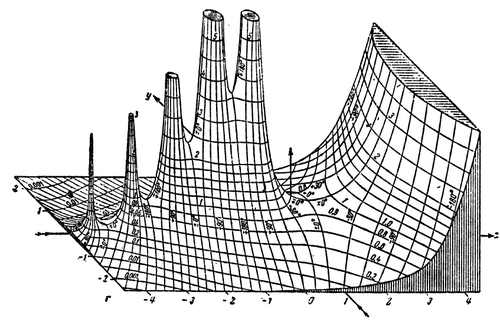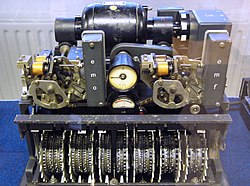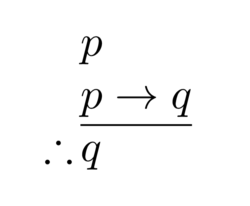Portal:Mathematics
The Mathematics Portal
Mathematics is the study of representing and reasoning about abstract objects (such as numbers, points, spaces, sets, structures, and games). Mathematics is used throughout the world as an essential tool in many fields, including natural science, engineering, medicine, and the social sciences. Applied mathematics, the branch of mathematics concerned with application of mathematical knowledge to other fields, inspires and makes use of new mathematical discoveries and sometimes leads to the development of entirely new mathematical disciplines, such as statistics and game theory. Mathematicians also engage in pure mathematics, or mathematics for its own sake, without having any application in mind. There is no clear line separating pure and applied mathematics, and practical applications for what began as pure mathematics are often discovered. (Full article...)
Featured articles –
Selected image –

Good articles –
Did you know (auto-generated) –

- ... that multiple mathematics competitions have made use of Sophie Germain's identity?
- ... that Fathimath Dheema Ali is the first Olympic qualifier from the Maldives?
- ... that The Math Myth advocates for American high schools to stop requiring advanced algebra?
- ... that Ewa Ligocka cooked another mathematician's goose?
- ... that despite a mathematical model deeming the ice cream bar flavour Goody Goody Gum Drops impossible, it was still created?
- ... that Catechumen, a Christian first-person shooter, was funded only in the aftermath of the Columbine High School massacre?
- ... that after Archimedes first defined convex curves, mathematicians lost interest in their analysis until the 19th century, more than two millennia later?
- ... that Fairleigh Dickinson's upset victory over Purdue was the biggest upset in terms of point spread in NCAA tournament history, with Purdue being a 23+1⁄2-point favorite?
More did you know –

- … that every positive integer can be written as the sum of three palindromic numbers in every number system with base 5 or greater?
- … that the best known lower bound for the length of the smallest superpermutation was first posted anonymously to the internet imageboard 4chan?
- ...that the mathematician Grigori Perelman was offered a Fields Medal in 2006, in part for his proof of the Poincaré conjecture, which he declined?
- ...that a regular heptagon is the regular polygon with the fewest sides which is not constructible with a compass and straightedge?
- ...that the regular trigonometric functions and the hyperbolic trigonometric functions can be related without using complex numbers through the Gudermannian function?
- ...that the Catalan numbers solve a number of problems in combinatorics such as the number of ways to completely parenthesize an algebraic expression with n+1 factors?
- ...that a ball can be cut up and reassembled into two balls, each the same size as the original (Banach-Tarski paradox)?
Selected article –
 |
| The German Lorenz cipher machine, used in World War II for encryption of very high-level general staff messages Image credit: Matt Crypto |
Cryptography (or cryptology) is derived from Greek κρυπτός kryptós "hidden," and the verb γράφω gráfo "write". In modern times, it has become a branch of information theory, as the mathematical study of information and especially its transmission from place to place. The noted cryptographer Ron Rivest has observed that "cryptography is about communication in the presence of adversaries." It is a central contributor to several fields: information security and related issues, particularly, authentication, and access control. One of cryptography's primary purposes is hiding the meaning of messages, not usually the existence of such messages. In modern times, cryptography also contributes to computer science. Cryptography is central to the techniques used in computer and network security for such things as access control and information confidentiality. Cryptography is also used in many applications encountered in everyday life; the security of ATM cards, computer passwords, and electronic commerce all depend on cryptography. (Full article...)
| View all selected articles |
Subcategories

Algebra | Arithmetic | Analysis | Complex analysis | Applied mathematics | Calculus | Category theory | Chaos theory | Combinatorics | Dynamical systems | Fractals | Game theory | Geometry | Algebraic geometry | Graph theory | Group theory | Linear algebra | Mathematical logic | Model theory | Multi-dimensional geometry | Number theory | Numerical analysis | Optimization | Order theory | Probability and statistics | Set theory | Statistics | Topology | Algebraic topology | Trigonometry | Linear programming
Mathematics | History of mathematics | Mathematicians | Awards | Education | Literature | Notation | Organizations | Theorems | Proofs | Unsolved problems
Topics in mathematics
| General | Foundations | Number theory | Discrete mathematics |
|---|---|---|---|
| |||
| Algebra | Analysis | Geometry and topology | Applied mathematics |
Index of mathematics articles
| ARTICLE INDEX: | |
| MATHEMATICIANS: |
Related portals
WikiProjects
![]() The Mathematics WikiProject is the center for mathematics-related editing on Wikipedia. Join the discussion on the project's talk page.
The Mathematics WikiProject is the center for mathematics-related editing on Wikipedia. Join the discussion on the project's talk page.
In other Wikimedia projects
The following Wikimedia Foundation sister projects provide more on this subject:
-
Commons
Free media repository -
Wikibooks
Free textbooks and manuals -
Wikidata
Free knowledge base -
Wikinews
Free-content news -
Wikiquote
Collection of quotations -
Wikisource
Free-content library -
Wikiversity
Free learning tools -
Wiktionary
Dictionary and thesaurus
More portals
- ^ Coxeter et al. (1999), p. 30–31; Wenninger (1971), p. 65.


























































